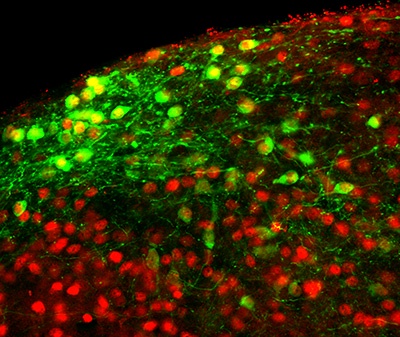
FRSE
Chair in Human Nutrition
- About
-
- Email Address
- lora.heisler@abdn.ac.uk
- Telephone Number
- +44 (0)1224 437446
- Office Address
Foresterhill
AB25 2ZD- School/Department
- School of Medicine, Medical Sciences and Nutrition
Biography
Professor Heisler investigates brain circuits regulating energy homeostasis in an effort to identify new targets amenable to obesity and type 2 diabetes medications. Professor Heisler received her PhD from Tufts University, USA in 1997 and held postdoctoral positions at the University of California, San Francisco USA and Beth Israel Deaconess Medical Center, Harvard Medical School USA. In 2001, Professor Heisler was promoted to Instructor and set up her laboratory at Harvard. She then relocated her group to the University of Cambridge, UK in 2004 where they worked for the next 10 years. Prof Heisler was a Wellcome Trust Senior Fellow at this time. The Heisler laboratory moved to the Rowett Institute, University of Aberdeen to take advantage of the Institute’s strengths in obesity research, ranging from molecules to man.
News
The MOOMIN (Mechanisms Of Obesity, Metabolism, Insulin Sensitivity and Nutrition) Lab welcomes new postdoctoral fellow Dr Shuwen Mu!
Congratulations Dr Alasdair Leeson-Payne on his first authored publication to be published in Cell Metabolism 2024.
Many congratulations to PhD student Dhamyaa Al Halboosi on her first paper published in Neuropharmacology Dec 2023 entitled "Modulation of GABA release by 5-HT1B receptors: An interplay with AMPA-receptors and voltage-gated calcium channels."
Best wishes to former postdoctoral fellow Dr Pablo Martinez de Morentin who is setting up his new lab at University of Leeds.
Congratulations Matev Arcon for his successful PhD viva!
See Prof Heisler present the lab's latest work at the Keystone 'Obesity Causes and Consequences' conference in Vancouver, Canada Feb 2024.
Sign up to attend the British Society for Neuroendocrinology's annual meeting in Aberdeen 1-3 July 2024 https://www.neuroendo.org.uk/page.php?item_name=BSN+Annual+Meeting+2024
Memberships and Affiliations
- Internal Memberships
-
Director of Research, Rowett Institute
Aberdeen Cardiovascular and Diabetes Centre member
- External Memberships
-
Deputy Editor, Molecular Metabolism
Scientific Advisory Board, Keystone Symposia
Latest Publications
Mesenchymal-specific Alms1 knockout in mice recapitulates metabolic features of Alström syndrome
Molecular Metabolism, vol. 84, 101933Contributions to Journals: ArticlesLoss of GPR75 protects against non-alcoholic fatty liver disease and body fat accumulation
Cell Metabolism, vol. 36, no. 5, pp. 1076-1087Contributions to Journals: ArticlesGLP-1 receptor agonist improves metabolic disease in a pre-clinical model of lipodystrophy
Frontiers in Endocrinology, vol. 15, 1379228Contributions to Journals: ArticlesA brainstem to hypothalamic arcuate nucleus GABAergic circuit drives feeding
Current Biology, vol. 34, no. 8, pp. 1646-1656.e4Contributions to Journals: ArticlesModulation of GABA release by 5-HT1B receptors: An interplay with AMPA-receptors and voltage-gated Ca2+ channels
Neuropharmacology, vol. 241, 109758Contributions to Journals: Articles
Prizes and Awards
Professor Heisler was the recipient of the Outstanding Scientific Achievement Award (OSAA) from the American Diabetes Association. Professor Heisler received the OSAA prize for her research identifying a new type of medication to improve type 2 diabetes. This prestigious award recognises research in diabetes that demonstrates particular independence of thought and originality. Her career scientific contributions include seminal discoveries in the brain control of appetite and blood sugar that demonstrate her innovation.
Professor Heisler commented: “Diabetes is such a widespread problem and it is crucial that we as scientists continue to research this disease in order to find new ways to combat it. It is extremely humbling to be recognised for our contribution to diabetes research. I work alongside many talented colleagues."
Professor Heisler was also the recipient of the Outstanding Scientific Achievement Award from the Obesity Society for her work defining the therapeutic mechanism of a globally prescribed obesity medication.
She has received similar prizes from other international societies and is regularly invited to give Keynote talks at scientific conferences.
- Research
-
Research Overview
Moomin Lab
Mechanisms Of Obesity, Metabolism, Insulin Senstivity and Nutrition

Our research aims to discover and characterise these brain circuits using cutting edge technology with the objective of locating points within the pathway that are amenable to manipulation with manmade (drug) or natural (hormone) substances.
We also examine the impact of diet and body weight on circuit rewiring and mechanisms restore appropriate system connectivity and activity.
The ultimate aim of our research is to identify new treatments for obesity and type 2 diabetes.


Cells in the brain that impact appetite Our work identifying a new treatment
for type 2 diabetes is on the journal coverCurrent Research
Current projects include:
- Identifying the brain mechanism of action of GLP-1 receptor obesity medications
- Defining how mutations in the orphan receptor GPR75 are protective for the development of obesity, type 2 diabetes and fatty liver disease
- Establishing how factors within the brainstem nucleus of the solitary tract (NTS) control food intake and body weight
- Defining how the brain controls physical activity and energy expenditure and how this circuitry become disrupted with ageing
- Targeting brain serotonin (5-HT) receptors for the treatment of type 2 diabetes
Research team:
- Dr Alasdair Leeson Payne - Research fellow
- Dr Akihiro Mori - Research fellow
- Dr Shuwen Mu - Research fellow
- Miss Raffaella Chianese - Laboratory Manager
- Miss Dhamyaa Al-Halboosi - PhD Student
- Mr Matevz Arcon - PhD Student
- Miss Hollie Whyte - MSc Student
- Miss Janvi Ghoricha - MSc Student
- Miss Jessica Christie - MSc Student
Funding and Grants
BBSRC
Diabetes UK
Wellcome Trust
Medical Research Scotland
- Teaching
-
Teaching Responsibilities
Frontiers of Biomedical Science - SM3002
- Publications
-
Page 2 of 6 Results 11 to 20 of 54
Molecular mechanisms of appetite control via 5-HT1B receptors
Nutrition Society Winter Conference, E26Contributions to Journals: Abstracts- [ONLINE] DOI: https://doi.org/10.1017/s002966512200026x
5-HT recruits distinct neurocircuits to inhibit hunger-driven and non-hunger-driven feeding
Molecular Psychiatry, vol. 26 , no. 12, pp. 7211–7224Contributions to Journals: Articles- [ONLINE] DOI: https://doi.org/10.1038/s41380-021-01220-z
- [OPEN ACCESS] http://aura.abdn.ac.uk/bitstream/2164/18408/1/He_etal_MP_5_HT_Recruits_VoR.pdf
- [ONLINE] View publication in Scopus
Role of serotonin in body weight, insulin secretion and glycaemic control
Journal of Neuroendocrinology, vol. 33, no. 4, e12960Contributions to Journals: Review articles- [ONLINE] DOI: https://doi.org/10.1111/jne.12960
- [OPEN ACCESS] http://aura.abdn.ac.uk/bitstream/2164/16346/1/Georgescu_etal_role_of_serotonin_VOR.pdf
- [ONLINE] View publication in Scopus
Pharmacological evidence for transactivation within melatonin MT2 and serotonin 5‐HT2C receptor heteromers in mouse brain
The FASEB Journal, vol. 35, no. 1, e21161Contributions to Journals: Articles- [ONLINE] DOI: https://doi.org/10.1096/fj.202000305R
- [ONLINE] View publication in Scopus
Developmental programming of appetite and growth in male rats increases hypothalamic serotonin (5-HT)5A receptor expression and sensitivity
International Journal of Obesity, vol. 44, pp. 1946-1957Contributions to Journals: Articles- [ONLINE] DOI: https://doi.org/10.1038/s41366-020-0643-2
- [ONLINE] View publication in Scopus
Neurochemical characterization of brainstem Pro-opiomelanocortin cells
Endocrinology, vol. 161, no. 4, pp. 1-13Contributions to Journals: ArticlesMolecular reductions in glucokinase activity increase counter-regulatory responses to hypoglycemia in mice and humans with diabetes
Molecular Metabolism, vol. 17, pp. 17-27Contributions to Journals: Articles- [ONLINE] http://www.sciencedirect.com/science/article/pii/S2212877818307506
- [ONLINE] DOI: https://doi.org/10.1016/j.molmet.2018.08.001
- [OPEN ACCESS] http://aura.abdn.ac.uk/bitstream/2164/11381/1/Molecular_reductions_in_glucokinase_activity_increase_counter_regulatory_responses_to_hypoglycemia_in_mice_and_humans_with_diabetes.pdf
Nucleus of the Solitary Tract Serotonin 5-HT2C Receptors Modulate Food Intake
Cell Metabolism, vol. 28, no. 4, pp. 619-630.e5Contributions to Journals: ArticlesSpecific Subpopulations of Hypothalamic Leptin Receptor-Expressing Neurons Mediate the Effects of Early Developmental Leptin Receptor Deletion on Energy Balance
Molecular Metabolism, vol. 14, pp. 130-138Contributions to Journals: ArticlesBace1-dependent amyloid processing regulates hypothalamic leptin sensitivity in obese mice
Scientific Reports, vol. 8, 55Contributions to Journals: Articles
